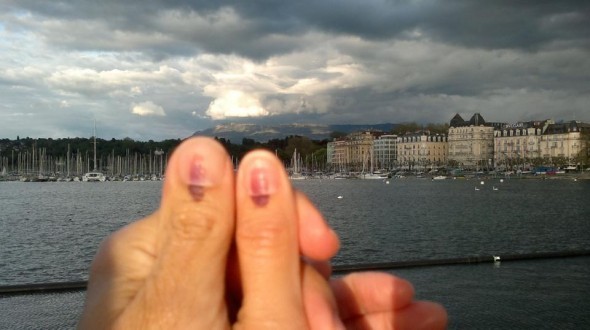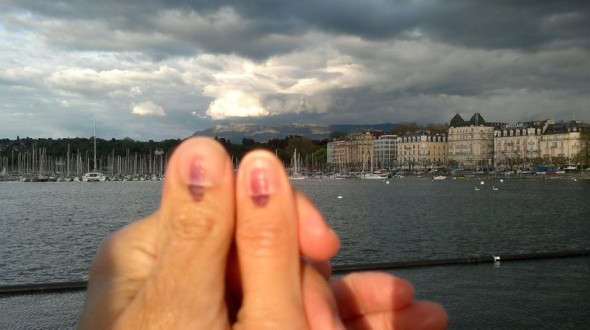
Post-Election Questions Answered for South Africans Abroad
Since the National Elections, many of those South Africans overseas who made a massive effort to vote have raised questions about the election process from the mysterious VEC10 form to the lack of voting stations and the distressing news for those in four cities that their votes were never even counted in the end. In a blog post […]

Since the National Elections, many of those South Africans overseas who made a massive effort to vote have raised questions about the election process from the mysterious VEC10 form to the lack of voting stations and the distressing news for those in four cities that their votes were never even counted in the end.

In a blog post on the DA Abroad’s website, Penny Tainton tackles some of the most pressing questions. Tainton is one of the DA’s two delegates on the IEC National Party Liaison Committee and was instrumental in pioneering the overseas vote in this election. Here are the questions and her answers:
1. Why weren’t there more voting stations abroad? Why couldn’t consulates be used, or temporary voting stations be set up?
The Hague Convention defines what can be considered to be the territory of any nation. Only areas classified as South African territory could be used for voting, and this precluded honorary consulates and the establishment of temporary voting stations. We did try to address this in our submissions to the Commission, and in our draft Bill, and will continue to look for solutions in future.
2. What are the options for more accessibility to voting abroad in 2019? Is the IEC considering alternative voting methods like online, postal, or proxy voting?
The IEC has been looking at the possibility of electronic voting. This has been used successfully for overseas voting by a number of countries. Postal or Proxy voting has not been, and is not likely to be, considered due to the possibility of electoral fraud.
3. Why do votes abroad not count towards the provincial ballot?
While we lobbied strongly for voters abroad to be allocated to a Province and to be provided with both ballots, the Commission elected not to allocate voters abroad to a Province, but to create a separate segment of the roll. There was consensus amongst all of the other political parties that people who did not live in the country could not be allocated to specific addresses.
4. What happened to the votes from Toronto, Lubumbashi, Cuba and Madrid that weren’t counted in this election? And what is going to be done to ensure this does not happen again?
The votes are effectively spoiled ballots. There will be a comprehensive election debriefing, and we will ensure that this is one of the points raised and addressed. It is interesting to note that the original ruling was that ballots had to arrive by 21:00 on Wednesday 7 May in order to be counted. At this stage, 12 countries were still outstanding, and the commission accepted our request to amend the closing time to the latest possible deadline of 21:00 on Friday 9 May, given that they had to announce results on the Saturday. The IEC itself made every possible effort to get the ballots on time, but were hampered by customs and the international courier.
5. Why were the votes counted in South Africa and not counted at the voting stations abroad?
The law does not provide for counting at voting stations abroad. Remember that there are no IEC staff or structures outside of the country, and this process must be managed and accounted for by the IEC.
6. Why were our ballots put in an envelope with our names on it? Aren’t our votes supposed to be a secret?
The external envelope was marked with voters’ details to enable proper reconciliation when the ballots arrived back in South Africa. It allowed the IEC to confirm the legitimacy of all ballots against the VEC10 applications before removing the external envelopes to preserve the secrecy of the vote and start the count. This process was overseen by party agents from various political parties, including three DA agents.
7. Many South Africans abroad were misinformed (or not informed at all) about the need to submit the online VEC10 form, and queued for hours to vote…only to find that they couldn’t. Will the DA be addressing this issue with the IEC? What is the purpose of the VEC10 form?
We will engage with the IEC on this in the election debriefing. The VEC10 form allowed for appropriate logistical arrangements to be made, for example the number of ballots, envelopes etc needed, as well as to effectively provide a “voters roll” for that station.
8. Why were some people’s names left off the voters roll despite their VEC10’s being approved? And why were they not allowed to vote despite being able to prove their VEC10 approval?
This should not have happened. We will follow up on every instance that is reported to us to try to understand why this happened.
9. Why did people abroad have to have both their ID and SA passport in order to vote whereas in SA, people only have to show their ID book?
A legitimate passport is a requirement of the Electoral legislation, and the ID book is an integral part of the electoral process.
10. Why was voting made on a week day which is not a public holiday and proved difficult for people to get to their nearest embassy as not everyone lives close to the embassies? Why can it not be on a weekend and also over 2 days e.g. Saturday AND Sunday? Voter registration took place over the weekend.
This is an issue that we will raise with the IEC. Engagement with and co-operation from DIRCO and embassy staff often proved difficult. The original plan was for embassies to only open for their normal business hours on a normal business day. We petitioned to ensure that voting hours were extended up until 9pm to allow for more opportunity for people who had to travel.
11. What will be done to improve the overseas voting facilities, especially at large voting stations like London and Dubai where the voter turnout is very high? This year, people were queuing for up to 4 hours, there were no toilet facilities, and mums and their children queued for over an hour in the sun, along with others who had special needs.
Again, consultation with DIRCO is the key to this, and we will have to ensure that there is strong engagement on this well in advance of the next National and Provincial Election.
Thank you to everyone who made such a tremendous effort to vote. Your voice did count. You did make a difference. We value your contribution to democracy.
IMPORTANT:
If you would like to lay an official complaint about voting abroad in Elections 2014 then please email the IEC directly at webmaster@elections.org.za and cc in the DA Abroad at contact@da-abroad.org. This will aid us in compiling our report for the election debriefing and also in addressing these issues to ensure they don’t happen again in future elections.
To view the original post, please click here.
